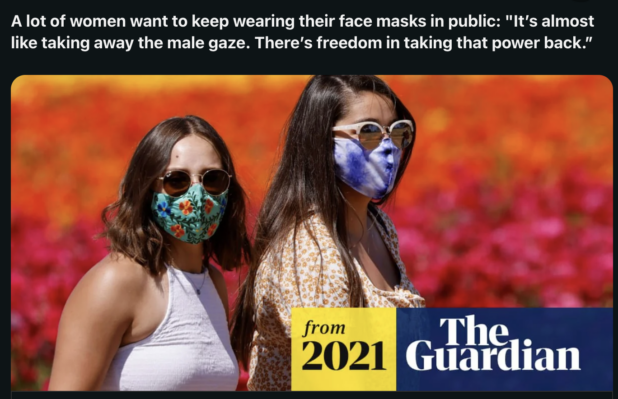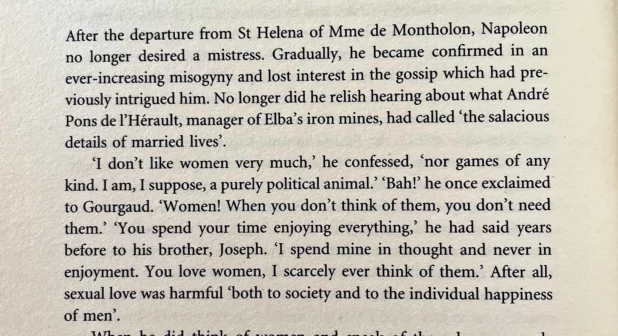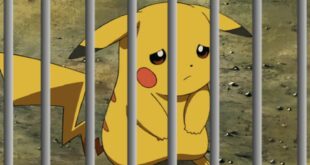(Editor’s Note: This is one of the worst disasters published here in the post-virus doom era.)
Demographics is destiny
— Elon Musk (@elonmusk) April 22, 2023
Women, apparently, are having less sex.
What the reader would expect for me to do here is say “this sounds good, but actually it’s bad, because….”
I am very aware that at least since the 2020 election hoax, I’ve become “Dr. Poison Fruit.”
In actual fact, “The Fruit of the Poisonous Tree” is a legal metaphor that means that any evidence obtained illegally is tainted and inadmissible. That is to say, if a police officer pulls over a car for speeding and opens the trunk and finds 100 kilos of cocaine, but the lawyer of the criminal is able to prove that he was not actually speeding when he was pulled over, and the original traffic stop was therefore illegal, then the cocaine cannot be used as evidence in court.
However, I have used this metaphor as a reference to another metaphor which I have forgotten the name of, and which may no longer be active in English, wherein every seemingly good phenomenon which happens in the Western world is meaningless because it is tainted by the denial of God. I may also make some reference to C.S. Lewis’ view of pride as the ultimate sin (which I actually find to be an uncharacteristically non-useful Lewisism).
Please see: Victoria’s Secret Embraces Ugliness, Signaling That the Porno Age is Already Totally Over
However, I am only making this assertion in terms of the positive actions of the Beast 666 – not the lack of actions by the Beast, and certainly not to individuals making positive changes for negative reasons.
This, typically, would be the point at which I have found myself buried under something too convoluted to be useful, and would delete all preceding text, given that the level of seriousness of the tone and its implications are lost on me, the writer, and I have therefore lost all control of the communications process. Instead of doing this, however, I will not do this, out of a peculiar spite for the reader, which only made itself manifest mere minutes ago, and will surely pass before I understand where I am going with this.
I will instead make an outrageous claim: a reduction in premarital sex by women is probably good regardless of why, but it is also possible that is not true.
And then, eventually, I’m going to claim that this is a conspiracy designed to explain the birthrate collapse which resulted from the vax.
Caitlin didn’t set out to become celibate – at least not in the beginning. Three years ago, she was coming out of an abusive relationship and wasn’t ready to meet someone else. Then Covid happened, and the lockdowns made it impossible anyway. “I thought during that time I needed space to heal and reflect on what I’d been through,” she says. Towards the end of 2020, the 23-year-old artist started therapy. “I realised if I was going to be sexually active, I needed someone who would understand my past, and where I was coming from. I don’t want to be with someone unless I know it’s committed, and I’m not in a rush to find that.”
And there it is: the thing.
It is like when the coronavirus masking phenomenon led the Guardian to promote the niqab.
The evil of society has resulted in withdrawing from society in a positive way.
She had been on dating apps, but found it hard to meet men who wanted a relationship, rather than just sex. “I found they would stop talking to me if I made it known I wasn’t going to hook up with them on the first date. I found a lot of men would put on a bit of an act to appear as if they wanted a relationship, then as soon as you took sex off the table while getting to know them, they disappeared. It’s tricky when a lot of dating is around hook-up culture, which I’m not interested in.”
Maybe, however, the woman is simply aging and becoming more and more bitter, as is the case with women.
Caitlin’s celibacy, three years in now, became intentional. She hasn’t missed sex itself, she says, and certainly not casual sex, although sometimes, “seeing people in relationships and having healthy sex lives, can make me go: ‘Why don’t I have that?’” But it has had unintentional benefits. “It’s taught me more about what I enjoy in sex, which I wasn’t expecting. I thought it was going to put me at a disadvantage, but I feel a lot more confident in my own sexuality.” While sex with someone else is out, masturbation is still in, and she says her libido has increased. “I think because exploring different things without dealing with another person has allowed me to find what I enjoy.” It has also made her more relaxed about finding a relationship (or not). “I’ve got other things to focus on. It’s if someone fits into my life rather than me needing to make room for them.”
So it is entirely negative, maladaptive behavior, which lines up with Christian thought only incidentally, in a way that almost makes a mockery of sexual morality.
On TikTok, voluntary or intentional celibacy has become a trend – the #celibacy hashtag has had more than 195m views – with those who practise it claiming it has improved their focus, mental health and energy. In January, it was reported that there was a 90% increase in Google searches for celibacy that month.
We already knew this.
It says it in the Bible.
“This coincides with a long-term trend among people today, in general, having less sex with fewer partners,” says Dr Justin Lehmiller, a Kinsey Institute research fellow and host of the Sex and Psychology podcast. “Humans are increasingly less sexually active, with some forgoing sex altogether.” Study after study of sexual behaviour, in different countries, show this. The last National Survey of Sexual Attitudes and Lifestyles (Natsal) in Britain found that 16% of men and 22% of women aged 16 to 74 were sexually inactive, and for most of them, it wasn’t a problem. While the authors noted the documented wellbeing benefits of a satisfying sex life, of those who had previously had sexual experience, the majority were not dissatisfied with their situation (around a third of men, and a quarter of women reported they were dissatisfied, although age had an effect, with younger people more dissatisfied than older people). The Natsal data is more than 10 years old, though, and its authors noted in a 2019 paper on the sexually inactive how little is known about them.
We know a lot about sexually inactive men. I can tell you this. It’s simply that this data is considered unimportant by a feminist society that assumes a man not having sex is dangerous or evil, and apparently it is only now that we are thinking about the existence of women who are “post-slut” sex-free.
And, I can pretty well tell you, it will only be the Guardian discussing this (at least in English).
The National Survey of Sexual Health and Behavior in the US found that between 2009 and 2018 there was a rise in adolescents reporting no sexual activity (partnered and alone), from 28.8% to 44.2% of young men and from 49.5% to 74% of young women. In one interview, the study’s authors raised several possible contributing factors, including gaming and social media taking time and precedence, more awareness of asexuality as an identity, a decline in alcohol use, an increase in “rough sex” practices such as choking that may be frightening or off-putting to many, and lower incomes.
lol @ pornography as instructional material leading to unsatisfied teen whores.
Who could have imagined??
Voluntary celibacy in the US, where Lehmiller is based, seems to have more links to religion than it does in the UK. Furthermore, he says, “in this #MeToo and post-Roe era [with the rollback of reproductive rights] we find ourselves in, the perceived risks associated with sex are higher, particularly for women. And, when you factor in the orgasm gap and the fact that women’s pleasure still isn’t on a par with men’s, some women are asking themselves whether sex is even worth it. If you see it as a high-risk, low-reward kind of thing, you might decide you’re better off without it.”
Haha.
The “ask the kike” section.
It’s still so strange that the Guardian manages to print articles where they give arguments that are not Jewish. If this was in the NYT/WaPo, the entire article would be Roe v. Wade and the “orgasm gap.”
He suggests that celibacy, for some, may be part of “the growing trend towards delayed adulthood. Individuals might see sex and relationships as distractions, or as not having much point until they’ve found stability in other life circumstances.” The pressures of studying, establishing a career or saving for a home may take priority. While voluntary celibacy seems less popular among non-religious heterosexual men, some have talked online about intentional celibacy providing more focus for their careers, with sex being a distraction.
But he will never tell you that video games are more fun than sex.
For those who are dating, apps have changed the way many people find partners, but as Lehmiller points out, online dating is an arena “where there’s a lot of toxic behaviour, brutal rejection and feelings of intense competition for mates. It can make sex and relationships feel like a high-stress, high-stakes thing. Some people may find that taking a pause from that is good for their mental health.”
Online dating is the World Trade Organization for the sexual marketplace.
I should delete everything else I’ve written here and rewrite everything around that sentence.
While celibacy is for many a positive personal choice, it can also be viewed as the result of, or a reaction against, a messed-up sexual culture, just as some of the second wave feminists chose political lesbianism decades ago. Last year, the “femcel”, or “female involuntary celibate”, went mainstream. “They feel the same sense of ‘humiliation and exclusion’ that ‘incels’ do,” as a piece in the Atlantic put it, “but they react to those feelings differently.”
It’s almost like someone lied to them.
Unlike the notorious misogynistic incels who blame women for not wanting to have sex with them, femcels posting in online groups tend to blame their celibacy on the soul-destroying sexual landscape and a society that, for all its hollow talk of “body positivity”, is still obsessed with looks and beauty conventions.
Shut up.
If you’re not explicitly attempting to have children, then how are you going to separate sex from physical attractiveness?
This is like a situation of a person becoming obese by eating ten thousand calories of romaine lettuce every day.
(Another notably good sentence.)
Louise Perry, author of The Case Against the Sexual Revolution, says that many young heterosexual women “now feel as if they have to run the gauntlet of hook-up culture if they want to have any kind of sexual relationship. I think a lot of them, quite fairly, would rather not have any sexual relationship at all.” The influence and availability of pornography, she adds, “has had a really destructive effect on sexual culture.” She says surveys show that “most women don’t get that much out of casual sex. The problem is, because our sexual culture is so oriented towards a more masculine style of sexuality, a lot of young women in particular don’t feel as if they are able to demand commitment from their partners. Increasing numbers are opting out of the sexual culture altogether.”
I don’t even know what you’re supposed to say to that.
Whose idea was it that women would get something out of casual sex? What could they get, other than their power trip? What value does the power trip have the next day? And what have they paid for it, emotionally, psychologically, and spiritually?
Who spread this idea into society in the first place?
Was it the Jews again?
It’s naive, she says, to think you can simply choose to avoid pornography and casual sex if you’re sexually active, “because the nature of sex in general, and social relationships, is that they’re networked – you have sex with people who have sex with other people, who watch porn. Even if you choose not to do that, other people do it, and it changes the culture. I think that, particularly in young people, who are super-sensitive to what other people think about them, the default setting now is to have pornified, casual sex.” For some people, opting out might feel like their only option.
You cannot have non pornified sex, no. That is a good point, if obvious.
The same people will tell you to do “foreplay” and then have sex for thirteen (13) minutes in order to cause a “female orgasm”(???)
We should maybe remember we are animals, physically, and just start showing kids the Discovery Channel.
This “sex as a nearly hour-long dramatic performance involving multiple ideological disciplines” is pathological behavior which is only possible now.
That’s what the article should have been about, frankly. Pornography oriented performative sex, even if it doesn’t include BDSM materials, is like if Mary Poppins was your real nanny.
Seriously, watch the video:
Then think about all the different implications of the sentence “Pornography oriented performative sex … is like if Mary Poppins was your real nanny.” They all apply.
Also: I’m going Napcel.
 Daily Stormer The Most Censored Publication in History
Daily Stormer The Most Censored Publication in History




